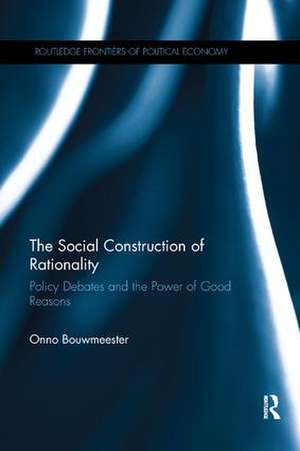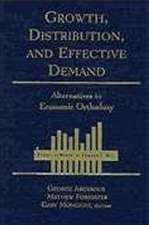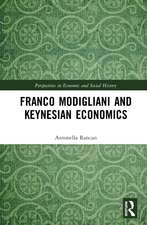The Social Construction of Rationality: Policy Debates and the Power of Good Reasons: Routledge Frontiers of Political Economy
Autor Onno Bouwmeesteren Limba Engleză Paperback – 18 oct 2018
Based on an argumentation analysis of six high-profile public debates, this book adds nuance to the concept of bounded rationality. The chapters show how it is socially constructed, and thus dependent on shared beliefs or knowledge, institutional context and personal interests. Three double case studies investigating the three rationalities illustrate how decision makers and stakeholders discuss the appropriateness of these rationalities for making decisions in different practice contexts. The first touches more on personal concerns, like wearing a niqab or looking at obscene art exposed in a public environment; the second investigates debates on improving the rights and position of specific minorities; and the third is based on the agreement on instrumental reasons for two kinds of investments, but the cost arguments are regarded less relevant when social norms or personal interests are violated.
The Social Construction of Rationality is for those who study political economy, economic psychology and public policy, as well as economic theory and philosophy.
Toate formatele și edițiile
| Toate formatele și edițiile | Preț | Express |
|---|---|---|
| Paperback (1) | 297.23 lei 6-8 săpt. | |
| Taylor & Francis – 18 oct 2018 | 297.23 lei 6-8 săpt. | |
| Hardback (1) | 992.90 lei 6-8 săpt. | |
| Taylor & Francis – 15 mar 2017 | 992.90 lei 6-8 săpt. |
Din seria Routledge Frontiers of Political Economy
-
 Preț: 310.95 lei
Preț: 310.95 lei - 9%
 Preț: 936.74 lei
Preț: 936.74 lei -
 Preț: 312.86 lei
Preț: 312.86 lei -
 Preț: 309.30 lei
Preț: 309.30 lei - 9%
 Preț: 867.54 lei
Preț: 867.54 lei -
 Preț: 325.09 lei
Preț: 325.09 lei -
 Preț: 152.66 lei
Preț: 152.66 lei -
 Preț: 310.01 lei
Preț: 310.01 lei -
 Preț: 312.75 lei
Preț: 312.75 lei - 9%
 Preț: 936.90 lei
Preț: 936.90 lei -
 Preț: 310.36 lei
Preț: 310.36 lei - 9%
 Preț: 938.47 lei
Preț: 938.47 lei -
 Preț: 309.79 lei
Preț: 309.79 lei -
 Preț: 295.14 lei
Preț: 295.14 lei -
 Preț: 151.96 lei
Preț: 151.96 lei - 9%
 Preț: 904.56 lei
Preț: 904.56 lei - 9%
 Preț: 934.94 lei
Preț: 934.94 lei -
 Preț: 309.79 lei
Preț: 309.79 lei -
 Preț: 310.55 lei
Preț: 310.55 lei -
 Preț: 155.43 lei
Preț: 155.43 lei - 9%
 Preț: 935.17 lei
Preț: 935.17 lei -
 Preț: 311.41 lei
Preț: 311.41 lei -
 Preț: 281.72 lei
Preț: 281.72 lei -
 Preț: 278.97 lei
Preț: 278.97 lei -
 Preț: 311.41 lei
Preț: 311.41 lei -
 Preț: 356.63 lei
Preț: 356.63 lei -
 Preț: 316.03 lei
Preț: 316.03 lei -
 Preț: 310.95 lei
Preț: 310.95 lei -
 Preț: 311.41 lei
Preț: 311.41 lei -
 Preț: 309.90 lei
Preț: 309.90 lei -
 Preț: 371.95 lei
Preț: 371.95 lei -
 Preț: 386.11 lei
Preț: 386.11 lei -
 Preț: 286.98 lei
Preț: 286.98 lei -
 Preț: 288.99 lei
Preț: 288.99 lei - 9%
 Preț: 934.73 lei
Preț: 934.73 lei -
 Preț: 359.03 lei
Preț: 359.03 lei -
 Preț: 329.09 lei
Preț: 329.09 lei -
 Preț: 341.32 lei
Preț: 341.32 lei - 26%
 Preț: 1047.06 lei
Preț: 1047.06 lei - 18%
 Preț: 1160.81 lei
Preț: 1160.81 lei - 18%
 Preț: 1543.68 lei
Preț: 1543.68 lei - 18%
 Preț: 1046.15 lei
Preț: 1046.15 lei - 18%
 Preț: 1052.03 lei
Preț: 1052.03 lei - 25%
 Preț: 767.47 lei
Preț: 767.47 lei - 18%
 Preț: 726.53 lei
Preț: 726.53 lei - 26%
 Preț: 822.54 lei
Preț: 822.54 lei - 18%
 Preț: 1782.93 lei
Preț: 1782.93 lei - 26%
 Preț: 1184.91 lei
Preț: 1184.91 lei
Preț: 297.23 lei
Preț vechi: 340.41 lei
-13% Nou
Puncte Express: 446
Preț estimativ în valută:
56.92€ • 58.65$ • 47.76£
56.92€ • 58.65$ • 47.76£
Carte tipărită la comandă
Livrare economică 22 februarie-08 martie
Preluare comenzi: 021 569.72.76
Specificații
ISBN-13: 9780367031176
ISBN-10: 0367031175
Pagini: 216
Ilustrații: 8
Dimensiuni: 156 x 234 x 16 mm
Greutate: 0.34 kg
Ediția:1
Editura: Taylor & Francis
Colecția Routledge
Seria Routledge Frontiers of Political Economy
Locul publicării:Oxford, United Kingdom
ISBN-10: 0367031175
Pagini: 216
Ilustrații: 8
Dimensiuni: 156 x 234 x 16 mm
Greutate: 0.34 kg
Ediția:1
Editura: Taylor & Francis
Colecția Routledge
Seria Routledge Frontiers of Political Economy
Locul publicării:Oxford, United Kingdom
Public țintă
Postgraduate and UndergraduateCuprins
1 What is rational?
2 How argumentation analysis reveals different rationalities
3 Expressive rationality: a human voice in the reasons we act on
4 Social rationality: struggles with reality
5 When instrumental rationality appears as irrational
6 Rationality interplays: from mutual support to critical evaluation
7 Implications for practice: how to spot irrationalities
2 How argumentation analysis reveals different rationalities
3 Expressive rationality: a human voice in the reasons we act on
4 Social rationality: struggles with reality
5 When instrumental rationality appears as irrational
6 Rationality interplays: from mutual support to critical evaluation
7 Implications for practice: how to spot irrationalities
Recenzii
"In an era where behavioralism flourishes and has even reached the vestiges of mainstream economic thought, reconsideration of what rationality actually is, is well-timed. I would implore all readers whose minds and work is ocused on decision-making by individuals in isolation or in groups to consult this academic work." - Wilfred Dolfsma, Organization
Descriere
This book shows that not one, but three different forms of rationality (subjective, social and instrumental) determine the final outcomes of strategic decisions executed by major organizations. Based on an argumentation analysis of six high profile public debates, this book adds nuance to the concept of bounded rationality. The chapters show how it is socially constructed, and thus dependent on shared beliefs or knowledge, institutional context and personal interests. Three double case studies investigating the three rationalities illustrate how decision makers and stakeholders discuss the appropriateness of these rationalities for making decisions in different practice contexts.










